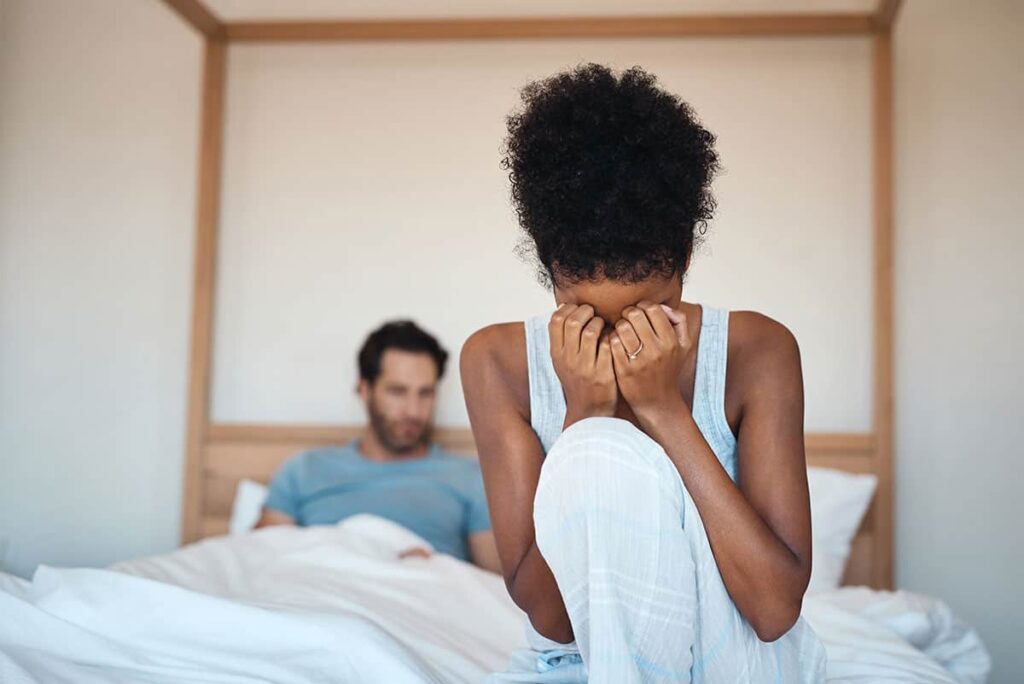Experiencing pain or discomfort during intercourse can occasionally happen. In most cases, it isn’t a cause for concern. But if you’re experiencing severe, frequent, or a new type of pain during intercourse, it may be a reason to visit your women’s health care specialist.
When is painful intercourse concerning?
Painful intercourse, also known as dyspareunia, refers to a persistent or recurrent pain that can happen during sexual intercourse. The condition can affect both men and women, but it occurs more commonly in females. According to the American Academy of Family Physicians (AAFP), up to 20% of American women experience painful intercourse.
It’s fairly common to experience pain during sexual intercourse once in a while, which can happen as a result of dryness, infections, inflammation, or an emotional or psychological issue. However, frequent or severe pain often necessitates a visit to a healthcare professional. Painful sex may be felt in the vulva or vagina and occur during or after intercourse. Many women also report pain in the perineum, pelvis, lower back, bladder, and/or uterus. The pain may be distinct and localized, or a broader sense of discomfort may accompany it. The pain can be described as an aching, burning, throbbing, or ripping sensation.
Recurring painful intercourse can be a warning sign of other gynecological concerns. Additionally, it can lead to a lack of intimacy that can stress and challenge relationships. Our gynecologist can help get you back on track to sexual wellness.
What are the causes of painful intercourse?
Causes of painful sex can be varied and include physical factors, psychological factors, or both. Occasional painful intercourse can sometimes be attributed to low libido, lack of foreplay, or emotional factors.
Physical or medical-related causes
Common physical or medical dyspareunia causes can include:
- Vaginal dryness: With sexual arousal, Bartholin’s glands at the entrance of the vagina secrete fluids to aid intercourse. Low production of fluid can lead to painful intercourse.
- Vaginismus: Caused by involuntary contraction of the pelvic floor muscles and vaginal walls, which can lead to painful sexual intercourse.
- Genital trauma: Any trauma to the genital region can lead to sexual pain. Some include female genital mutilation (FGM), pelvic surgery, episiotomy, or an injury from an accident.
- Inflammation or infection: Inflammation around the vaginal opening is called vulvar vestibulitis. Vaginal yeast infections, urinary tract infections, sexually transmitted infections (STIs) such as herpes, or sexually transmitted diseases can also lead to painful intercourse.
- Menopause: Menopause can cause painful sex due to decreased estrogen levels, leading to vaginal dryness, atrophy and loss of elasticity in the vaginal tissues, reduced blood flow, and changes in pH balance. This is also the case for women who are breastfeeding
- Health conditions: Conditions like vulvodynia, endometriosis, pelvic inflammatory disease (PID), uterine prolapse, Interstitial cystitis, irritable bowel syndrome (IBS), or fibroids can sometimes cause painful intercourse. Usually, these conditions cause pain during deep penetration or pain that is more acute in particular positions.
- Medications: Some medications, like birth control, can decrease sexual desire and reduce vaginal lubrication.
- Skin Disorders: Such as irritation or allergic reactions to clothing, laundry detergents, or personal hygiene products
Physical factors aren’t the only possible causes of painful intercourse.
Emotional or physiological causes
Emotional and psychological factors can play a role in painful intercourse. Stress, fear, and other emotions can cause tightening of the vaginal and pelvic floor muscles, hypervigilance to uncomfortable or painful sensations, and decreased arousal.
- Anxiety, fear, and depression can inhibit sexual arousal and contribute to vaginal dryness or vaginismus
- Stress can be a big factor in triggering a tightening of the pelvic floor muscles, resulting in pain
- Many women have paralyzing emotional feelings surrounding sex, such as guilt, shame, embarrassment, low self-esteem, or fear. Stress and anxiety can ruin being “in the moment” with your partner, which might affect your body’s ability to respond to sex.
A history of sexual abuse or sexual violence may contribute to painful sex.
A partner’s sexual desires and concerns
Sometimes, a partner’s dysfunction can affect your desire to have sex, your sexual response, and your enjoyment of sex. If you and your partner have different expectations for frequency or type of sex, you may have difficulty getting fully aroused for sexual intercourse. Another common problem is a partner’s delayed orgasm. The prolonged sexual activity for some may result in bruised genital areas or soreness. Alternatively, a partner’s inability to become or maintain arousal can contribute to emotional and psychological factors that can lead to painful intercourse.
How is painful intercourse diagnosed?
Dr. Aliabadi will often start by reviewing your medical history and discussing your symptoms. While it can be difficult to talk about such an intimate topic, it’s essential to explain the exact location, length, and timing of the pain. Additionally, you may need to talk about previous sexual experiences, reproductive history, and emotional factors to help Dr. Aliabadi fully understand potential causes.
After discussing your pelvic pain symptoms, she will perform a pelvic exam to try to identify the cause of the pain. During this exam, she can check for skin irritation, feel your vaginal and pelvic muscles, and assess for inflammation or infection. In some cases, an ultrasound may be needed to see the ovaries, fallopian tubes, and uterus to check for concerns like ovarian cysts or fibroids.
What are the treatment options for painful intercourse?
Dyspareunia treatment options aim to relieve the underlying cause of painful intercourse and improve sexual health. Options can include medication, mental health counseling, or possibly both.
Medication can often help alleviate pain associated with medical conditions, especially when it is related to an infection or inflammation. If existing medications are causing vaginal dryness, a doctor may recommend alternatives. Topical estrogen creams may help women who experience vaginal dryness, particularly postmenopausal women, due to low estrogen levels.
If sexual abuse, trauma, or other emotional issues are the root cause of the condition, counseling may help. Counseling can also help you cope with the emotional and relationship consequences of painful or difficult intercourse. Some techniques can help relax the vaginal muscles and decrease pain levels you experience during sex, which are often a part of desensitization therapy.
If you’re experiencing painful intercourse, talk to Dr. Aliabadi
Dr. Aliabadi and her compassionate team are experts in women’s health care and the conditions women may experience, including painful intercourse. When you’re treated by Dr. Aliabadi, you’re guaranteed to feel safe, heard, and well cared for.
We invite you to establish care with Dr. Aliabadi. Please make an appointment online or call us at (844) 863-6700.
The practice of Dr. Thais Aliabadi and the Outpatient Hysterectomy Center is conveniently located for patients throughout Southern California and the Los Angeles area. We are near Beverly Hills, West Hollywood, Santa Monica, West Los Angeles, Culver City, Hollywood, Venice, Marina del Rey, Malibu, Manhattan Beach, and Downtown Los Angeles.
It’s important to address painful intercourse with your doctor. However, ways to try and make sex less painful include changing positions, using lubrication, and taking your time.
Feeling uncomfortable after intercourse while pregnant can be normal; things like increased pelvic pressure, vaginal dryness, and cramping due to oxytocin released during orgasm can cause discomfort. But you should always seek your doctor’s advice if you are experiencing pain while pregnant.
Occasional constipation usually won’t cause pain during intercourse. However, chronic constipation is often associated with pelvic dysfunction, which could make sex painful.
Resources:
https://www.acog.org/womens-health/faqs/when-sex-is-painful

















